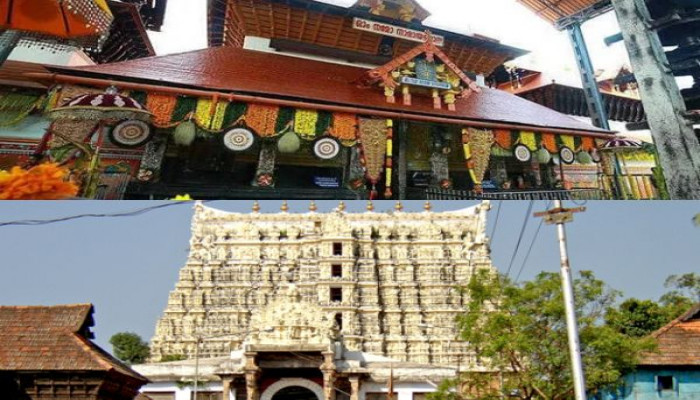Audits reveal major lapses and flags missing valuables at Guruvayur Temple
- In Reports
- 06:33 PM, Oct 21, 2025
- Myind Staff
Consecutive audits of the Guruvayur Devaswom have revealed how poorly the treasures of the Sri Krishna temple, including gold, silver, ivory, and manjadikuru or red lucky seeds, are being managed. The 2019-20 and 2020-21 audit reports by the state audit department show that even though the temple holds immense wealth and religious importance, its management remains weak, opaque, and vulnerable to misuse.
The main concern highlighted in the reports is the handling of elephant tusks and ivory at the Guruvayur Devaswom’s Punnathur Kotta sanctuary. The 2019-20 audit found that during that year, tusk trimming and ivory handling involved 522.86 kilograms of ivory, none of which was handed over to the forest department as required by law. Between April and November 2019, tusks and ivory chips weighing 505 kilograms on September 26, 2019, 14.18 kilograms on September 19, 2019, 2.35 kilograms from 2018-19, 730 grams on April 22, 2019, 320 grams on July 14, 2019, and 280 grams on July 29, 2019 were either removed or kept without proper documentation. The audit also noted that the required seizure memo and handover receipts were missing.
The audit report said, “As per the letter from the assistant conservator of forests, the devaswom was directed to furnish details of the tusks and ivory chips in its custody within ten days, but neither was the information provided nor were the tusks or ivory pieces handed over to the forest department.”
The observation reflected the extent of non-compliance and raised concerns that temple-linked ivory assets may have remained outside legal oversight without any records or accountability.
Responding to the audit findings, Guruvayur Devaswom chairman V K Vijayan said the matter related to a time before the present board took charge. “The matter pertains to the time before the current governing body took charge. It already came up before the court, where the devaswom filed its reply. Since 2022, six elephants belonging to the devaswom have died, and in all those cases, the postmortems were conducted in the presence of the forest department. The ivory was never handed over to us — we only receive the postmortem reports. The observations in the audit report refer to a period well before that,” he said.
Inside the temple, the audit’s examination of the double lock register, which records gold and silver items used for daily rituals, found serious irregularities. Items returned after use often showed unexplained weight loss. A silver pot lost 1.19 kilograms within ten months, while another lamp was lighter by several hundred grams. In some cases, returned items were made of different materials. A gold crown was replaced with a silver ornament, and a silver vessel weighing 2.65 kilograms was replaced with one weighing only 750 grams. No investigation or disciplinary action followed these discrepancies.
The 2019-20 audit also found that 17 sacks of manjadikuru offered by devotees and stored in the western tower of the temple were missing. The sacks were auctioned at 100 rupees per kilogram, but the successful bidder never collected them. CCTV footage later showed health department workers loading the sacks onto a devaswom tractor and driving away. Officials claimed the sacks were shifted to a nearby godown for space management, but no further record showed where they were taken or if they were included in the next auction.
The audit further noted that large donations and valuable offerings were not recorded in official registers. The accounting of copper, bronze, and panchaloha items stopped in 2016. A four-eared bronze vessel weighing two tonnes, offered in 2022 by a devotee from Palakkad and valued at around 15 lakh rupees, was never issued a receipt or recorded in the register and was not assigned to anyone’s custody. Devotees often donate expensive items such as Kashmiri saffron, which the temple buys at 1.47 lakh rupees per kilogram, but such offerings were only recorded in a personal register maintained by a deputy administrator, bypassing the receipt system and escaping audit checks.
The auditors pointed out that although the Guruvayur Devaswom Act 1978 and the Rules 1980 require an annual physical verification of all valuables, no such verification has taken place for more than forty years. The 2020-21 audit repeated the same findings, confirming that the failure to verify temple gold and silver was not an isolated lapse but a continuing administrative failure.
As per the law, the devaswom managing committee must carry out an annual physical inspection of all valuables and submit a verification report to the devaswom commissioner by June 30 every year. Orders issued as early as 2009 made the chief finance and accounts officer personally responsible for this verification. However, the 2020-21 audit found that no such exercise had been conducted, no verification certificate had been issued, and no details of gold or silver holdings had been provided even after repeated requests by the Kerala State Audit Department in March and July 2023.
Replying to the audit’s remarks on unverified valuables, Vijayan said that the current board had strengthened internal controls. “Under the present governing body, all the offerings received by the temple — including gold and silver — are being properly recorded and maintained in full compliance with audit requirements,” he said.







Comments